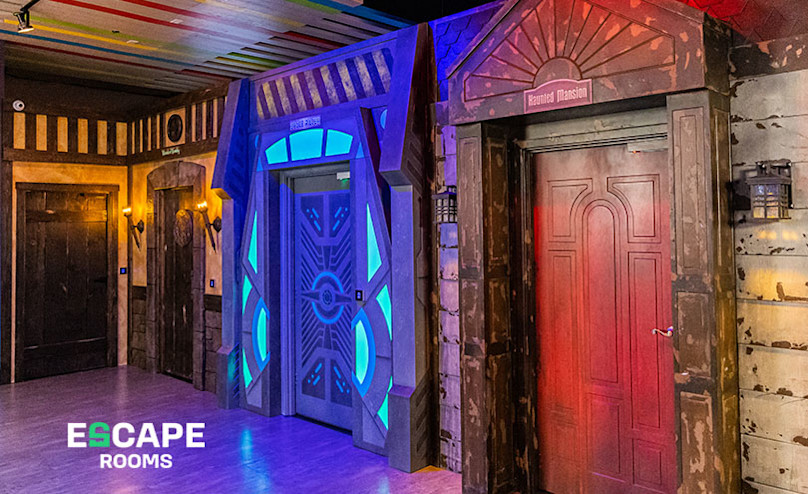Delighting Escape Room in Minneapolis Mall of America-- Book Now
Delighting Escape Room in Minneapolis Mall of America-- Book Now
Blog Article
Group Techniques: How to Work together Successfully in a Retreat Space
Navigating the intricacies of a getaway space necessitates greater than plain excitement; it calls for a well-coordinated method grounded in clear interaction, tactical function projects, and adept time administration. Groups need to actively listen to every member's understandings, appoint roles that straighten with specific strengths, and preserve regular check-ins to ensure focus and protect against redundancy. By cultivating a setting that values communication and flexibility, groups can dramatically increase their efficiency and success rates. The nuances of these methods can transform the experience, yet how exactly can they be implemented to make the most of the possibility for success?
Establish Clear Communication

To facilitate clear communication, it is essential to mark a central point of contact for information circulation. Quick, concentrated updates from each team member can maintain the team educated without overwhelming them with info.

Assign Functions Strategically
While clear interaction establishes the foundation for reliable teamwork, appointing functions tactically ensures that each staff member's staminas are used properly. In a getaway area situation, the time-sensitive and complicated nature of challenges requires a well-organized method to job delegation. By determining and leveraging specific expertises, teams can maximize their problem-solving abilities and boost general efficiency.
First, evaluate the unique skills and qualities of each individual. For example, a person with a keen eye for detail may stand out in finding surprise objects, while a logical thinker might be much better matched to resolving puzzles - best escape room. It's similarly crucial to have a leader who can manage development, take care of the timeline, and make crucial telephone calls when necessary. This duty frequently requires strong organizational and social skills.
Second, guarantee that functions are versatile and versatile. As new challenges arise, the group should have the ability to pivot, reallocating tasks as required. This flexibility assists preserve energy and avoids bottlenecks that might occur as a result of rigid function tasks.
Ultimately, a tactical strategy to duty project not only optimizes the staminas of each staff member but likewise promotes a cohesive setting, driving the group towards an effective escape.
Use Diverse Skills
Recognizing and utilizing the diverse abilities within your team can dramatically raise your efficiency in a getaway area. Each staff member brings one-of-a-kind toughness to the table, and properly leveraging these capacities can quicken problem-solving and enhance total effectiveness. A team member with strong analytical abilities could stand out at decoding complex codes or patterns, while an additional with keen empirical capacities may swiftly detect covert hints that others could ignore.
Motivate group members to articulate hop over to these guys their insights and concepts promptly, guaranteeing that all possible remedies are thought about. In addition, assigning jobs that align with each participant's toughness can prevent bottlenecks and make certain that progression is continual.
Additionally, diversity in abilities commonly translates site to diversity in assuming designs, which is vital in an escape space setup. While some difficulties may call for rational reasoning and precision, others could take advantage of imaginative and association of ideas. By identifying and leveraging this diversity, groups can deal with a more comprehensive array of challenges better, thereby increasing their possibilities of a successful escape.
Manage Time Properly

Determine noticeable problems and separate tasks based on team members' toughness, guaranteeing that nobody is still. This practice can help keep the team concentrated and prevent time from sliding away unnoticed.
Additionally, prevent one-track mind. If a problem is taking as well long, rotate group members or go on to an additional obstacle, returning later with fresh point of views. Communication is extremely important-- maintain everybody upgraded on fixed challenges and staying tasks to avoid repetitive initiatives.
Finally, use directory any hints or hints moderately however strategically - best escape room. Recognizing when to request for assistance can conserve beneficial time. By sticking to these time monitoring principles, groups can significantly improve their possibilities of an effective and satisfying retreat space experience
Debrief and Show
Representation is an important facet of group development and improvement in the context of getaway areas. As soon as the obstacle is completed, whether successfully or otherwise, it is critical for the team to involve in an organized debriefing session. This procedure permits staff member to evaluate their efficiency, recognize strengths, and determine areas for improvement.
Start the debrief by reviewing what worked out. Highlight specific instances of effective communication, analytic, and collaboration. Identifying these favorable behaviors enhances them and encourages their repetition in future difficulties.
Discuss moments of complication, miscommunication, or ineffective approaches. Encourage an open and positive dialogue where team members can share their point of views without concern of objection.
Final Thought
In verdict, effective collaboration in an escape room is asserted upon clear interaction, critical function jobs, the efficient application of varied abilities, and skillful time management. Routine check-ins and structured debriefings are vital for preserving focus and promoting constant renovation. By creating a natural and adaptive team environment, the probability of successfully fixing puzzles and accomplishing the goal of getting away the room is considerably boosted. This strategy not just guarantees success however additionally advertises collective growth and knowing.
Report this page